The ofVOICES
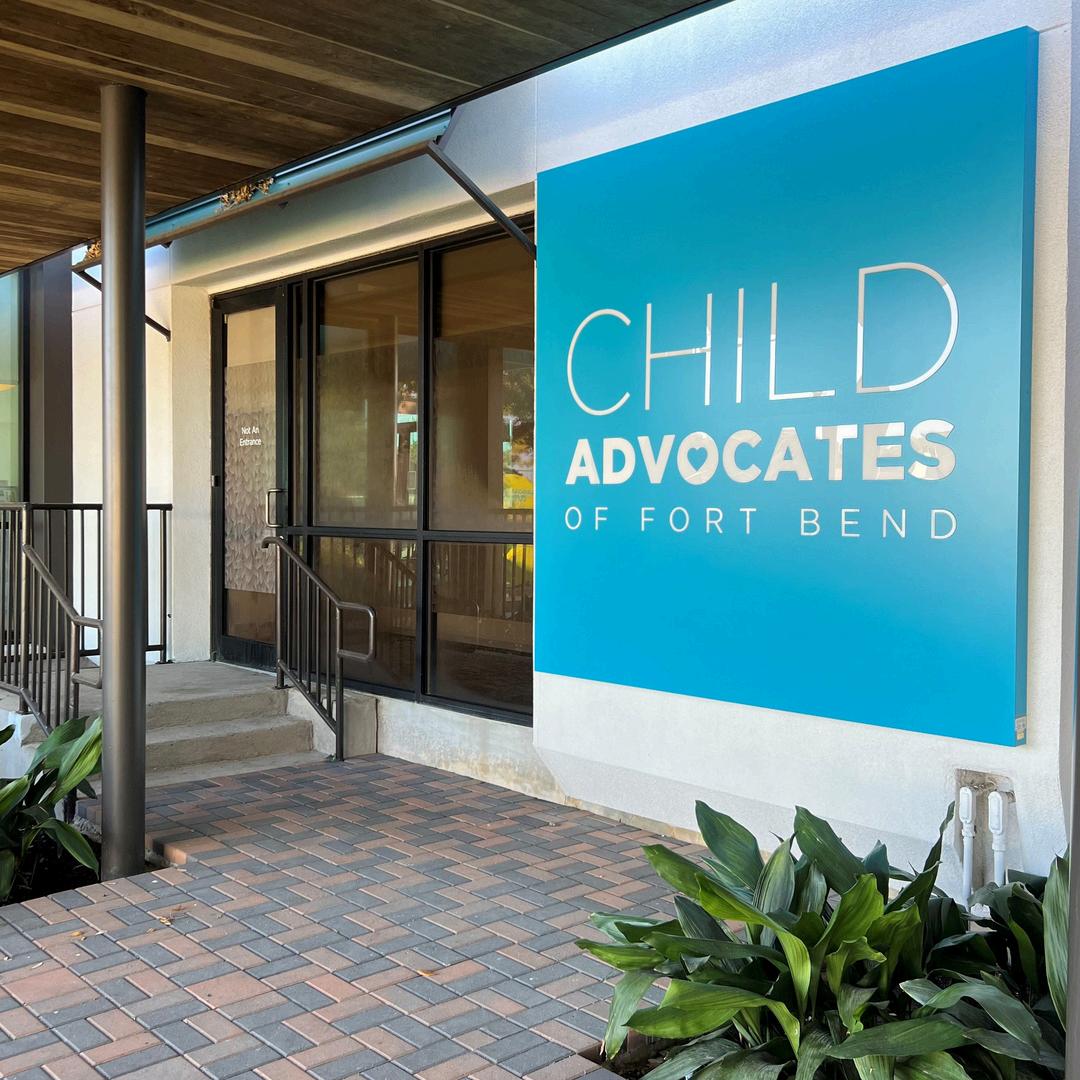
Keeping you informed on our mission: Strengthen the Child's Voice, Heal the Hurt, and Break the Cycle of Abuse and Neglect for Children and Families in Fort Bend and surrounding counties.
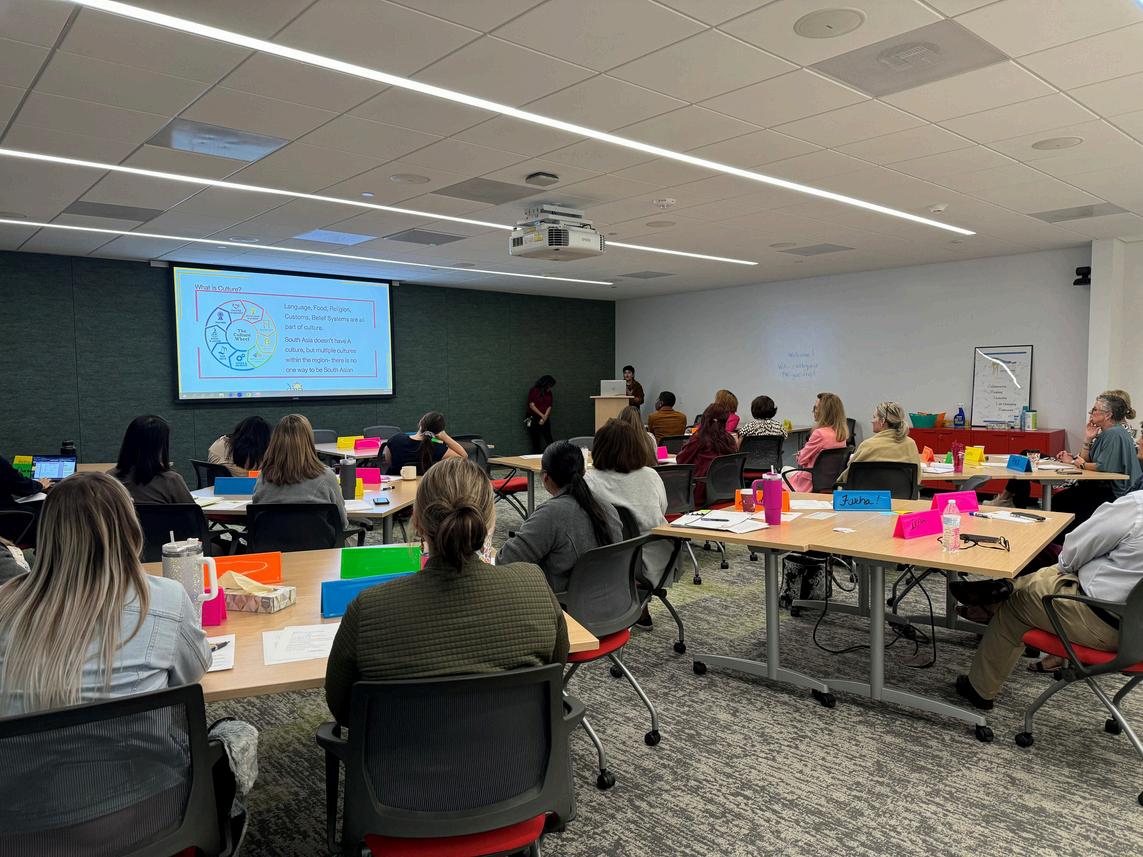



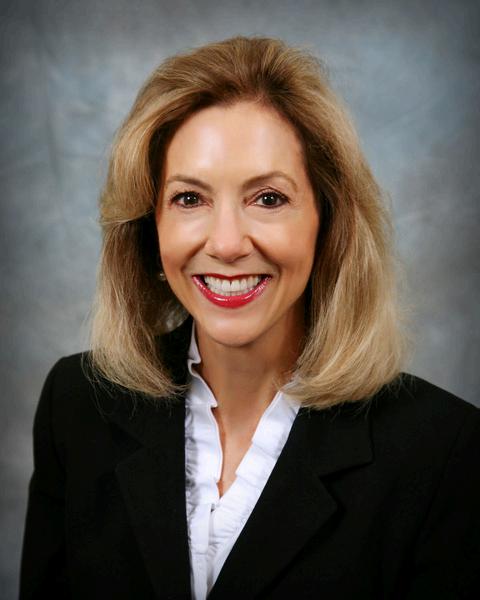


Keeping you informed on our mission: Strengthen the Child's Voice, Heal the Hurt, and Break the Cycle of Abuse and Neglect for Children and Families in Fort Bend and surrounding counties.





We’re dedicating this issue of VOICES to all our Hispanic and Latino children, families, volunteers and staff
September is Hispanic Heritage Month and we are dedicating this issue of VOICES to all our Hispanic and Latino children, families, volunteers and staff. Child Advocates of Fort Bend serves a disproportionate number of Hispanic children and families: 44% compared to the Hispanic population of Fort Bend County which is 25%. Nationwide, nearly 4 in 5 Latino youth suffer at least one traumatic childhood experience, including abuse, and lack the proper care, support and environment they need for healthy development in formative years, according to a new research review from Salud America! , a national network for healthy change at UT Health San Antonio. Salud America!’s “The State of Latino Early Childhood Development” examines the latest science on childhood trauma and its effect on Latino
kids The research shows Latino youth (77.8%) are more likely to have “adverse childhood experiences: -- poverty, neglect, abuse or household dysfunction (i.e., parental divorce, violence, substance abuse, mental health issues). About 28% of Latino youth suffer four or more of these traumas. However, several solutions are emerging including promoting access to and availability of early childhood education from birth to age 5, training the childcare workforce to provide trauma-informed care for kids, assessing childhood history and including developmental/ behavioral screening in medical care, providing culturally relevant home visits, offering learning enrichment opportunities and teaching social and emotional skills.
To ensure the best outcomes for our Hispanic/Latino children, we must be continued next page

culturally sensitive to their needs, identities, customs and practices We have developed numerous specialized services at CAFB that support the solutions identified in the research A sampling includes the following:
-Infant and Toddler: focusing on early childhood development, attachment and strengthening the critical bond between parents and children
-Trauma-informed Care (TBRI): approaching children through a trauma lens
-CASA Advocacy: visiting with Hispanic children in their homes so they understand the dynamics and the environment
-Bilingual Staff: providing a diverse Spanish-speaking staff as forensic interviewers, clinical family
advocates, criminal court advocates and therapists to best serve Spanish-speaking and bilingual children and families
-Clinical Family Advocacy: assessing Hispanic families’ needs and accessing appropriate resources by our bilingual advocates
-Forensic Sexual Assault Exams: conducting medical histories including presence of adverse childhood experiences by forensic nurses
-Courtesy CASA: visiting children placed away from their home counties, many of whom are Hispanic or Latino by heritage.
-Education Council: navigating the education system and identifying resources to help Hispanic
children with academic and behavioral needs
-Community Outreach and Education :presenting safety and awareness information in both English and Spanish at schools, community centers and youth-serving organizations with high Hispanic presence
These are just a few of the ways that Child Advocates of Fort Bend serves our Hispanic/Latino clients to advocate for each child’s best interests and their needs
Look inside for more information about Hispanic Heritage Month, the importance of grandparents in a child’s life, our Voices For Children Breakfast and all the other many activities and initiatives that have kept us busy this month
Thank you for all you do to support Child Advocates of Fort Bend and the children we serve who have experienced abuse and neglect Thank you for joining us on this journey to Strengthen the Child’s Voice, Heal Their Hurt and Break the Cycle of Abuse and Neglect
For the Children's Sake,
Ruthanne
Ruthanne Mefford, CEO
NOTE: Throughout the articles, we are using the terms Hispanic and Latino interchangeably. Hispanic refers to a person with ancestry from a country whose primary language is Spanish. Latino refers to a person with origins from anywhere in Latin America (Mexico, South and Central America) and the Caribbean.
By Ruthanne Mefford


In 2018, Child Advocates of Fort Bend embarked on the single largest capital improvement in our 33-year history. With a growing staff, expanded services and programs, more volunteers, year-round training needs and a 200% increase in the number of clients over the past decade, we undertook a capital campaign we named For The Children’s Sake. What we envisioned as a 3-year project with a goal of raising $6 million quickly transitioned to a 6-year project with a much larger scope and a budget of $10 million. We want to report that we have now completed the remodeling, upgrading and expansion of our Davis George Campus and are well positioned to accommodate the growing number of children and families needing our services over the coming years. It is with deep gratitude that we thank our foundations and donors for making this possible. Thank you to Board Members Nancy Olson who chaired the campaign, Darrell Roth who provided project management services, Marcelo Moacyr who served on the Project Team, and Jim Lockwood who served on the Building Committee as well as all the members of the Capital Campaign Committee: Sarah and Tom Abraham, Margie Adolph, Hilary Brawner and Tony Clark, Tammy Brown, Farrah Gandhi, Valerie Golden,


John Healy, Dave Johnston, Rhonda and Tommy Kuykendall, Regina Morales, Josh Pipes, Bill Rohrbach, Mike Smith, James Steenbergen, Pat Somers, Massey Villarreal, and Cathy Zapalac.
This was a huge undertaking and was implemented in four phases:
Phase I (2018 - 2021): Complete remodel of our existing building which houses our Administration and CASA Wing, our Donor Reception Lobby, Kitchen/Breakroom, conference rooms and partner suites for County Attorneys, District Attorneys and CPS. Addition of 10,000 square-foot Children’s Advocacy Center with expanded therapy wing, 3 family meeting rooms, 6 forensic interview rooms with adjoining viewing rooms, a beautiful new reception lobby and play room/waiting room as well as offices and workstations for a growing staff of clinical family advocates, criminal court advocates, forensic interviewers, multidisciplinary team intake specialists, and data specialist We created a beautiful enclosed courtyard, an outdoor butterfly garden and entry courtyard continued next page
Phase II (2021-2023): Remodel of Building #1 situated in the rear of our parking lot and the addition of a new Building #2 to provide much-needed storage for children’s items for our Treasure Room and seasonal items We connected these two buildings with a Pavilion to create more functional space which proved invaluable during Covid when much of our programming had to move outside
Phase III (2023-2024): Addition of a Wellness Garden to provide a sensory-filled environment for our staff and children to provide an outside environment for relaxation, recovery and healing Adjacent to the garden is a fenced Playing Feld for children’s games, exercising and free play We also added a new Parking Lot to replace the 90 spaces we lost when we expanded the footprint of our building
Phase IV (2024): New exterior and interior Signage and the addition of a new Forever Angels Donor Wall which recognizes our donors who have pledged a legacy gift to CAFB
We could not have accomplished this without the generosity of the many foundations and businesses who provided the majority of the capital funds Our lead foundations and businesses were: The George Foundation, The

Henderson-Wessendorff Foundation, JE and LE Mabee Foundation, Houston Endowment, The William Stamps Farish Fund, The Meadows Foundation, Fred and Mabel R Parks Foundation, The Fondren Foundation, Sunderland Foundation, BGE, Inc, Charles A Frueauff Foundation, Madison Charitable Foundation, OCuSOFT, Sewell Automotive, Sprint Waste Services and many others who provided “restricted capital funds” specifically for this purpose Note that these sources of funds do not impact the separate pool of funding that we seek each year for operational funding to support all the services and programs for our children and families Generous individual donors including 100% of our board members and 100% of our staff as well as many other loyal donors contributed the remainder of the funding to reach our goal As with foundations, these donors made additional donations over and above their regular gifts that provide direct support for the children and the array of 18 services that we provide We are excited, grateful and humbled by your belief and trust in Child Advocates of Fort Bend that we will be good stewards of your gifts and use them wisely and for the purpose you intend We now have a beautiful, expanded Davis George Campus to serve the thousands of children who have experienced abuse and neglect This will serve us and the entire Fort Bend community for years to come

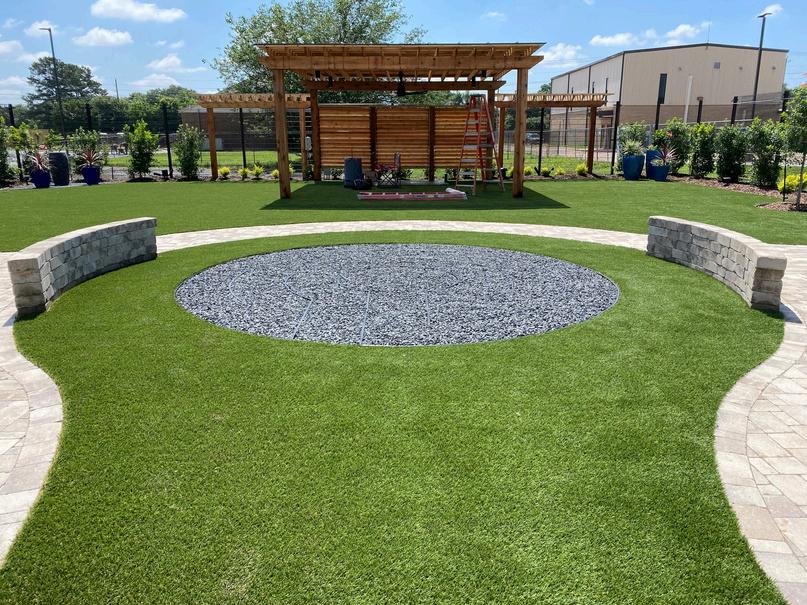

Mental health awareness is crucial for fostering a supportive environment for individuals facing mental health challenges This rings true in many Latino communities, in which here continues to be opportunities to understand cultural strengths and barriers to improve mental health treatment
Bridging the Gap in Treatment: Family plays a crucial role in supporting individuals facing mental health challenges In Latino culture, Familialism a strong emphasis on family unity and support is a fundamental value As Brenda Zavala, Bilingual Therapist, points out, educating caregivers about what mental health
entails can be incredibly impactful This approach helps demystify mental health issues and encourages families to engage more openly in therapeutic processes This is further supported by Kimberly Bautista, Bilingual Clinical Family Advocate, who shares a success story about a client whose biological mother was able to support her child through a difficult time, illustrating the positive impact of psychoeducation and family involvement
In addition, Kimberly Bautista emphasizes the importance of bilingual services and the need for culturally competent therapy Many Latino continued next page

families face challenges due to the lack of Spanish-speaking clinicians By ensuring that mental health professionals can communicate effectively with their clients, these barriers can be reduced
There are still significant gaps in mental health support within the Latino community Lizbeth Ocampo, Lead Forensic Interviewer, and Kristy Gutierrez, Director of CAC Program Services, note that mental health issues are relatively new and often misunderstood, with education on these topics still needing improvement Social media and school-based programs are helping to address these gaps, but continued efforts are necessary to foster a more inclusive and supportive environment Lizbeth adds that
community events, school presentations, and social media outreach are also essential in bridging gaps in mental health knowledge
Promoting mental health awareness within the Latino community involves addressing cultural barriers, improving access to bilingual services, and continuing educational efforts By leveraging community support, engaging families, and fostering open conversations, it is possible to make significant strides in supporting mental health As the community evolves and new generations embrace these changes, there is hope for continued progress and greater understanding For more information on how you can bridge the gap, download the BIPOC Mental Health Toolkit from Mental Health America Information is available in both English and Spanish
By Jen Brown
If you search “Grandparents raising grandchildren” in Google, article after article comes up with information, statistics, and resources Research has long shown the benefits of a child having grandparents in their lives is significant Most relationships between children and grandparents are not on a day-to-day basis and the responsibilities are on a different level than parenting When the grandparent becomes the main caregiver, there are different challenges to be aware of Knowing these challenges helps us be better equipped to take care of ourselves and one another
The number of grandparents raising their grandchildren has been steadily increasing over the years Grandparents raise their grandchildren for many reasons At Child Advocates of Fort Bend, we typically encounter grandparents taking care of their grandchildren primarily due to parental substance abuse, abuse and neglect, incarceration, or mental illness While grandparents may experience a sense of fulfillment in caring for their grandchildren, they also face unique challenges that require understanding and support

Common Challenges Faced by Grandparents Raising Grandchildren:
Legal issues: While some may have legal status to raise their grandchildren, many do not, which can make things difficult when trying to make decisions for them
Financial Strain: Grandparents often find themselves in a difficult financial situation, as they may need to retire earlier or adjust their budgets to accommodate the additional expenses of raising a child
Emotional Toll: The emotional burden of raising a child can be significant, especially if the grandparents are dealing with grief or other personal challenges

Lack of Support: Grandparents may feel isolated or unsupported, as they navigate the challenges of raising a child in a role that is not traditionally theirs
Health Concerns: Caring for a child can be physically demanding, and grandparents may face health concerns that make it difficult to fulfill their responsibilities
How You Can Support Grandparents Raising Grandchildren:
Offer Assistance: Help with tasks like grocery shopping, transportation, or childcare can make a significant difference in the lives of grandparents raising grandchildren 1
Let grandparents know that they are not alone and that you value their efforts
3 Educate Yourself: Learn about the challenges faced by grandparents raising grandchildren and the resources available to them This knowledge can help you provide more informed support
4 Connect Them with Other Grandparents: Encourage grandparents to connect with other grandparents who are in similar situations Sharing experiences and support can be invaluable
By offering support and understanding, we can help grandparents raising grandchildren navigate the challenges they face and provide their grandchildren with the love and care they deserve

updates on training, staff and MORE!
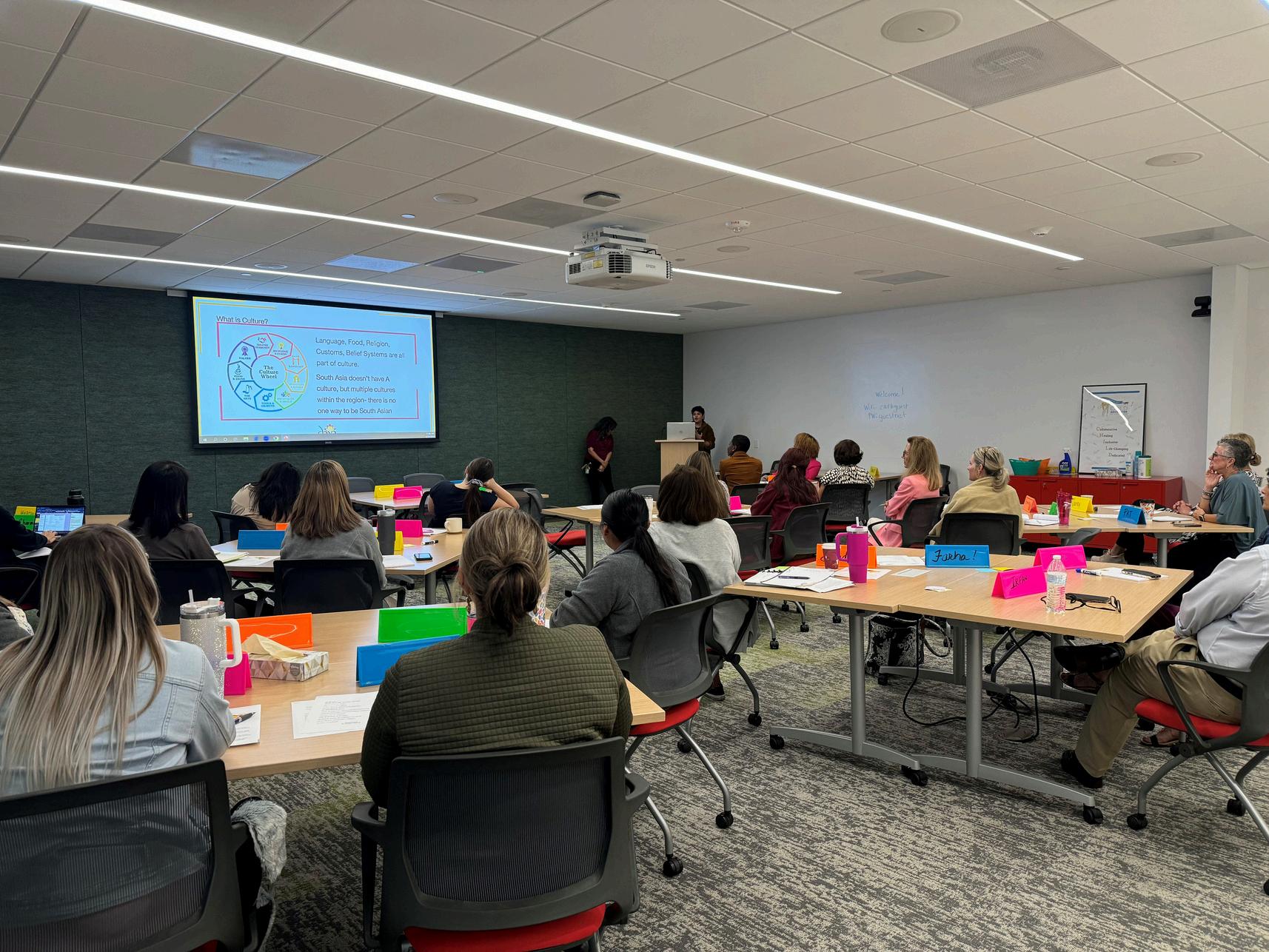
Thank you to our partnership with Daya which offered our staff, volunteers and board members an important training about the importance of cultural sensitivity and competency related to the South Asian community they serve. The intersectionality of services between our agencies is critical to ensuring trust, hope and healing for the clients we serve. We appreciate your expertise and are so grateful for our collaboration!
Presenting were Gayatri Joshi, Advocacy Manager and Misbah Lakhani, Outreach Coordinator

Child Advocates of Fort Bend and Lamar Consolidated Independent School District (LCISD) are joining forces to enhance the welfare and protection of children in the community. This partnership leverages the strengths of both organizations to provide comprehensive support for children who have experienced abuse or neglect.
LCISD plays a crucial role in this partnership by facilitating access to children in need and providing a supportive educational environment. The collaboration includes training for school personnel to recognize signs of abuse and neglect, prevention education for children on campus and their parents as well as ensuring that children receive timely and appropriate interventions.
Recently Child Advocates of Fort Bend participated in the LCISD Leadership Retreat for district administrators as well as hosting elementary and secondary counselors onsite for “Back to School” meetings and engaging counselors and administrators in the work of our agency. The agency is focused on helping the district by providing outreach and education to campuses with Day of Innovation for the 20242025 school year.
This partnership exemplifies a trauma informed, community-based approach to child welfare and education, aiming to break the cycle of abuse and neglect and foster a safer, healthier environment for all children in Fort Bend County.
By Heather Waterwall
Parent Support Groups are making a comeback at the Children’s Advocacy Center
The Clinical Family Advocates (CFA’s) are in the process of referring and assessing clients for a “parent support” group and “teen survivor support” group to launch this Fall The curriculum is Circle of Hope created by the Washington Coalition of Sexual Assault Programs The CFA’s will be facilitating these groups once a week for eight sessions
The hope is to continue to offer both groups ongoing and eventually expand to create and provide different types of groups in both English and Spanish to better meet the needs of all clients

Did you know that Child Advocates of Fort Bend participates in the TX CASA Specialty License Plate Program?
You can order a custom license plate with the phrase “Big Voices for Little Texans” Not only can you spread awareness and show your support for us but a portion of the cost of the plate goes to Texas CASA and the local programs to increase our statewide efforts to advocate for

every child in the foster care system. To order your plate go to https://www.txdmv.gov/motorists/lice nse-plates and search for CASA under specialty plates OR visit your local tax assessor ’ s office and ask for the Court Appointed Special Advocate license plate
By Andrea Haro
Collaborative Family Engagement (CFE) is a team-based approach to engage, find, and work with family members and fictive kin in the creation and development of a lifetime network for young people in the foster care system CFE helps children achieve strong connectivity and permanency faster
CFE uses Family Finding and Engagement tools, otherwise known as CFE tools, to assist with making connections and building networks for our children and families. CFE provides creative tools for volunteers and supervisors to use with the child, parent or relative to learn about who they identify as important people to them, and to more fully hear their voice and story.
The CFE Tools App is available to download on your cell phone. The CFE Tools App has many
of the CFE tools available to complete in person with our children in foster care as well as the important people in their lives The app provides step by step directions to complete the tools as well as saving the information you enter so you can build on the tools over time
After creating an account, you will receive an email from us asking you to allow time for us to verify your information before approving your account. As soon as we approve your account, you will receive an email informing you of your approved status. You can then login to the CFE Tools App with your email address and password. You will be able to complete any of the tools presented in the app, with as many different people as you would like.



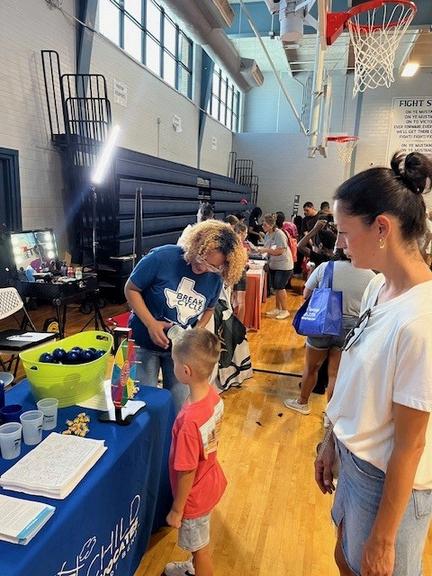
Child Advocates of Fort Bend was thrilled to participate in community back-to-school events last month! We participated at the Lamar CISD Back to School Block Party and the AccessHealth Back to School Health Fair The events provided fun and informative experiences for families in the community
Children and their parents had the opportunity to learn about child abuse prevention and the resources available through Child Advocates of Fort Bend Our team was on hand to answer questions, provide information, and offer support
We want to thank Lamar CISD and AccessHealth for inviting us to participate in these important events!





By Jen Brown
Over the past month, the generosity of Fort Bend has been showing up at Child Advocates of Fort Bend on a near-daily basis. Our children needed backpacks and the FRIENDS of Child Advocates of Fort Bend organization answered the call. They delivered 201 fully customized backpacks filled with each child’s school supply list inside. Those 201 backpacks were sent to our children in foster care and clients we serve in the CAC.
The need didn’t stop there, however. New CASA children and clients coming in for their first appointments at the CAC needed school supplies, as well. We had one couple call and ask how many fully packed backpacks they could bring and then quickly delivered 50. We had volunteers, board members, friends of volunteers, and people who found us online to drop off school supplies. The generosity was amazing to watch unfold.
Not that it should surprise me because the WA Parish Golf Committee continuously asks what
CAFB needs, but once again they arrived with our current biggest wish Our Clinical Family Advocates who work with teens in the CAC had an ideaSensory Coping Kits So, the WA Parish Golf Committee answered that call by delivering 570 journals, thousands of stickers, and pens for each kit These tools will be used to help our teens and youth walk through their journey of healing The measure of this kindness is beyond what I can put into words
New blankets and toys were delivered, and they are being handed out to every client that comes into our CAC for a Forensic Interview I’ve often heard children talk about the significance of the stuffed animal or the blanket they received at the CAC and what an impact it makes
So, thank you, Fort Bend, for your extreme generosity and compassion in partnering with us to take care of our children and families We truly couldn’t do it without you The beauty of humanity is shining brightly at Child Advocates of Fort Bend because of our community










When we think of leaving a legacy gift to an organization like Child Advocates of Fort Bend financial contributions are the first to come to mind. However, leaving a lasting legacy doesn’t always have to involve money. Many people wish to support causes they care like but might not have the financial resources to do so. Fortunately, there are several meaningful ways to make a nonmonetary legacy donation to a nonprofit, helping to ensure your values and passions continue to make an impact long after you ’ re gone. Here are some popular options:
One of the most common forms of nonmonetary legacy donations is through bequests of property or other valuable assets. This might include real estate, vehicles, or even rare collectibles. Donating these assets can significantly benefit a nonprofit by either providing a resource they can directly use or selling the items to fund their programs.
Gifts of stocks, bonds, or other securities are another powerful way to support a nonprofit.
“I have been involved with Child Advocates of Fort Bend for more than fifteen years and make it a priority to support this incredible organization in any way that I can I want the children of Fort Bend County to continue being protected and cared for , both now and in the future , which is why I have chosen to become a “Forever Angel” and to honor CAFB with a legacy gift”

These donations can often be more advantageous than cash gifts, both for the donor and the organization. Donating appreciated securities allows you to avoid capital gains tax, potentially offering a larger gift to the nonprofit.
When making these kinds of donations, it's essential to consult with a financial advisor and the nonprofit to ensure the process is smooth and that both parties receive the maximum benefit.
Many nonprofits can benefit from the donation of personal possessions or memorabilia, especially if they have historical significance or could be used in fundraising auctions. These items might include art, jewelry, or collections of rare books, coins, or stamps.
Donating intellectual property, such as patents, copyrights, trademarks, or royalties, is another unique way to leave a legacy. If you hold the rights to a valuable piece of intellectual property, such as a book, song, or invention, you can arrange to transfer those rights to a nonprofit.
This type of donation can provide ongoing revenue for the organization through royalties or licensing fees, creating a continuous stream of support for their work.
Moreover, it allows your creative or intellectual work to contribute to causes you care about, even after you ’ re gone.
5.
Another impactful way to leave a nonmonetary legacy is by organizing a fundraising event in your honor, either during your lifetime or as part of your estate planning. These events can raise awareness and support for the nonprofit’s work, bringing together people who share your passion for the cause.
For instance, you could request that instead of flowers at your funeral, donations be made to a specific nonprofit. Alternatively, you could arrange for an annual event, like a walk-a-thon, to be held in your memory, with all proceeds going to the cause you care about.
Leaving a legacy through non-monetary donations is a powerful way to support the causes you care about now and in the future. There are many meaningful ways to contribute beyond simply writing a check.
If you would like to explore ways you can support CAFB with a legacy gift, please contact plannedgiving@CAFB.com
We would be honored to help you become a “Forever Angel” and support the children of Fort Bend County for generations to come.

The 33rd Annual Christmas Home Tour is scheduled for December 6th and 7th. The two-day Home Tour hosts visitors from all over Fort Bend County and surrounding areas. Over 2,000 guests will tour the homes, including the 600 volunteers who take their time to volunteer and be a part of this very special event!
Do you like to decorate?
Interested in having your home featured on the Home Tour or know someone who would like to get more information? We would love to talk to you. Please contact Tarina at TSheridan@cafb.org to chat!
Do you want to help?
Please grab your friends and be a host, a Home Tour committee member OR share your baking skills by baking homemade cookies for the Tour.
For more information contact Tarina at TSheridan@cafb.org.

Thismonth,wehaveimmediateneedfor:
Snackbags:individualservingbagsof goldfish,teddygrahams,andfruitsnacks insandwichbaggies
Additionalitemscanbefoundonour WISHLIST
Didyouknowthatyoucandonatecars,airplanes,boats, motorcyclesortrucksandselectChildAdvocatesofFortBend toreceivetheproceeds? VisitHEREforquestionsorcontact Lisaatlmoore@cafb.org

September 10, 2024

TBRI Intro and Overview
10am - 4pm
Texana Admin Building
September 12, 2024
Voices for Children Breakfast
September 24, 2024
TBRI® Connecting 10am - 4pm
CAFB Training Room
September 24, 2024
Sip & Stroll
5:30pm - 7:00pm
Contact Lisa at LMoore@cafb.org to reserve your spot
October 18
THAT IS NOT IN MY TOWN
Debunking the Myths of Child Sex Trafficking & Exploitation
Contact Dana at DMersiovsky@cafb.org for more info
October 22, 2024
Darkness to Light
Contact Dana at DMersiovsky@cafb.org for more info
October 26, 2024
Year of the Dragon Party
For reservations or details click here
November 22, 2024
National Adoption Day
save the date
December 6+7, 2024
Christmas Home Tour

“Cultural differences should not separate “Cultural differences should not separate us from each other, but rather cultural us from each other, but rather cultural diversity brings a collective strength that diversity brings a collective strength that can benefit all of humanity” can benefit all of humanity”
- Robert Alan - Robert Alan